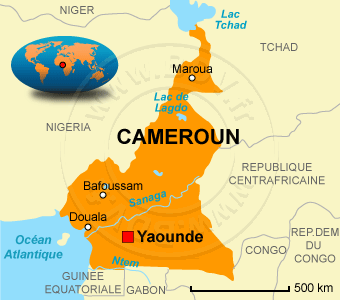Cameroun: The Battle of Languages Serves Colonial Masters

There is increasing likelihood of a civil war in Cameroun.
Captured from German interests during WWII by the Free French the Camerouns were divided into British Cameroun to the North and French Cameroun to the South. At its Independence from France January 1, 1960, French Cameroun became the Republic of Cameroun or Cameroun as we know it. To the North, under plebiscite, the southern portion of British Cameroun voted to join the French speaking Republic of Cameroun, while the northern (Muslim) portion of British Cameroun voted to join English speaking Nigeria.
Currently the President of Cameroun, Paul Biya, has countered a rebellion by elements of Cameroun’s English speaking minority who object to discrimination and selective denial of services and are countering the state’s security increasingly with armed force. Rebel forces are pushing to secede, to form a country called “Ambazonia”.
Rebel strength is primarily in the north-west along the border with English speaking Nigeria, with some strength along the coast which traditionally draws wealthier people. There is some representation in the Capital Yaounde to the southeast.
Taking advantage of Cameroun’s tendency toward tropical drift under Paul Biya, Anglophone groups of the West declared independence for “Ambazonia”, October 1, 2017, as a small western region snuggled up to Nigeria and hosting an expensive TV network and electronic startups.
One may remember that at Cameroun’s Independence in 1960, the peoples were not chary of blood which unfortunately surprised European merchants in the bush, while neighbouring countries met independence more gently. With the the French and English demarcation lines decided by popular vote, Cameroun is a poor area for English language interests to arbitrarily assert themselves. That could only and inevitably lead to repression, then wider conflict. So any Anglophone expansion is very likely planned and furthered by outside interests. Cameroun’s domestic Anglophone and English militant organizations have acted unwisely.
Remember as well that part of the package which Paul Kagame‘s Tutsi forces took along from Uganda in their invasion of Rwanda, was the English language and a most favourable exchange rate for the U.S. dollar. In choices between colonial languages Rwanda’s Hutu were basically French speaking yet the usage of both the English and French languages are foreign elements to African interests.
Part of the Anglophone strategy for Cameroun seems to be calling the persecution of English speakers ‘genocidal,’ as headlined by The Guardian, quoting a lady in the bush. At this point the conflict rises from disruption of state services, acts of violence by Anglophone militants, and a predictable response to calls for Anglo secession. Reported enthusiastically by U.S.A. not-exactly-pacifist sources such as Waging Nonviolence, the English language western media tend to place their language and funding before war or peace. Partly as a result of our moral ignorance, and partly because there’s a reasonable suspicion of a tactical use of genocide, the Camerounais of both European language alliances may be endangered and share an early genocide warning.
We’ve learned from Rwanda that it’s necessary to establish the mutual risk of genocide for both language groups in a civil war; in Rwanda both the Hutu and Tutsi suffered mass slaughters although under the Tutsi victory and rule it has became against Rwandan law to mention the genocide of Hutu (Note the case of Rwandan political prisoner Victoire Ingabire Umuhoza).
*
This article was originally published on Night’s Lantern.
Partial Sources
“‘This is a genocide’: villages burn as war rages in blood-soaked Cameroon,” Peter Zongo, May 30, 2018, The Guardian;
“Cameroon military and separatists fuel ‘cycle of violence’, says Amnesty,” June 12, 2018, BBC News;
“Ambazonians struggle for independence from Cameroon amid military takeover,” Phil Wilmot, June 12, 2018, Waging Nonviolence.

